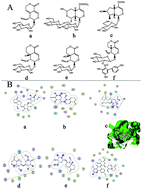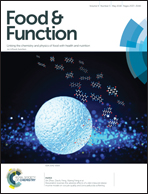Hepatoprotective activity of iridoids, seco-iridoids and analog glycosides from Gentianaceae on HepG2 cells via CYP3A4 induction and mitochondrial pathway†
Abstract
Gentianaceae herb extracts have been widely used as food additives, teas or medicinal remedies for various diseases and disorders of the human body. Herein, the potential effects of iridoids, seco-iridoids and analog glycosides from gentian on acontine-induced hepatotoxicity were investigated in HepG2 cells to obtain metabolic data of drug-biotarget interactions. Molecular docking analysis was performed to assess the binding efficiencies of 53 iridoids, seco-iridoids and analog compounds obtained from 50 gentian species to the active sites of human CYP3A4 enzyme. The docking scores of 29 iridoids, seco-iridoids and 24 analog glycosides were calculated from the free energy of ligand–protein complexes using a computer-assisted docking simulation. After comprehensive evaluation, 6 of these compounds, i.e., gentiopicroside, sweroside, swertiamarin, loganic acid, 6-O-β-D-glucosyl-gentiopicroside and amarogentin were selected to evaluate their hepatoprotective effects. Quantitative real-time PCR was used to measure the expression levels of CYP3A4 mRNA in HepG2 cells. Amarogentin displayed the most clear inductive effect on CYP3A4 mRNA levels in the HepG2 cells. Moreover, amarogentin was further studied for acontine-induced toxicity in the HepG2 cells to determine the potential mechanisms. Amarogentin displayed obvious inductive effect on CYP3A4 mRNA levels in the HepG2 cells. These results elucidated that the hepatoprotective effects were caused by the facilitation of drug metabolism, amelioration of mitochondrial dysfunction and reduction of oxidative stress. Our data demonstrated that the naturally found iridoids, seco-iridoids and analog glycosides in gentian may be responsible for the hepatoprotective effects of gentian-extracted compounds and thus, this study may be useful in the food industry or in clinical practice.



 Please wait while we load your content...
Please wait while we load your content...